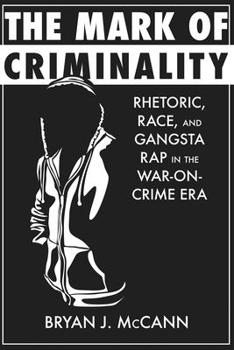The Mark of Criminality: Rhetoric, Race, and Gangsta Rap in the War-On-Crime Era
Select Format
Select Condition 
Book Overview
Illustrates the ways that the "war on crime" became conjoined--aesthetically, politically, and rhetorically--with the emergence of gangsta rap as a lucrative and deeply controversial subgenre of hip-hop In The Mark of Criminality: Rhetoric, Race, and Gangsta Rap in the War-on-Crime Era, Bryan J. McCann argues that gangsta rap should be viewed as more than a damaging reinforcement of an era's worst racial stereotypes. Rather, he positions the works of key gangsta rap artists, as well as the controversies their work produced, squarely within the law-and-order politics and popular culture of the 1980s and 1990s to reveal a profoundly complex period in American history when the meanings of crime and criminality were incredibly unstable. At the center of this era--when politicians sought to prove their "tough-on-crime" credentials--was the mark of criminality, a set of discourses that labeled members of predominantly poor, urban, and minority communities as threats to the social order. Through their use of the mark of criminality, public figures implemented extremely harsh penal polices that have helped make the United States the world's leading jailer of its adult population. At the same time when politicians like Ronald Reagan, George H. W. Bush, and Bill Clinton and television shows such as COPS and America's Most Wanted perpetuated images of gang and drug-filled ghettos, gangsta rap burst out of the hip-hop nation, emanating mainly from the predominantly black neighborhoods of South Central Los Angeles. Groups like NWA and solo artists (including Dr. Dre, Snoop Dogg, and Tupac Shakur) became millionaires by marketing the very discourses political and cultural leaders used to justify their war on crime. For these artists, the mark of criminality was a source of power, credibility, and revenue. By understanding gangsta rap as a potent, if deeply imperfect, enactment of the mark of criminality, we can better understand how crime is always a site of struggle over meaning. Furthermore, by underscoring the nimble rhetorical character of criminality, we can learn lessons that may inform efforts to challenge our nation's failed policies of mass incarceration.
Format:Hardcover
Language:English
ISBN:0817319484
ISBN13:9780817319489
Release Date:June 2017
Publisher:University Alabama Press
Length:208 Pages
Weight:1.06 lbs.
Dimensions:0.9" x 6.1" x 9.1"
Customer Reviews
0 rating





